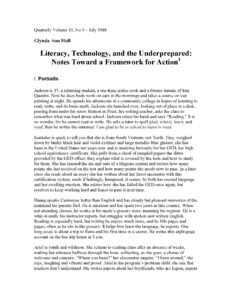Literacy, Technology, and the Underprepared: Notes Toward a Framework for Action
Excerpt
I wish I knew some magic. I‘d like there to be an incantation that we could chant, a potion, a ritual, a powerful charm. If there were, if we had such things, we could quickly put them to excellent use. We could arrange our universe—our society, our governance, our schools, our instructional theories— such that Jackson and Ariel, Kuntalee and Nora and Huang, would succeed in school, would learn the literacy skills they believe they need, would go on to play out the satisfactory careers and lives they envision.
I speak of magic and potions and special charms because there seem to be such powerful and pervasive and deeply rooted constraints that operate to hold these students back, extraordinary forces that no ordinary solutions can oppose. Children of minority parents, poor children, children who are somehow outside the social mainstream learn special ways of using language, researchers believe, special ways of relating to one another, of structuring time and place, and these ways are not recognized in our middle class institution of school. The problem lies also, some have long recognized, in the very structure of society itself, which is mirrored by, reproduced in school, and ordains the success of some children but the failure of others. Treading on the heels of this explanation is a related one, that young people resist socialization into docility—and rightly so—but in the process forfeit the learning they need in order to mount any effective challenge to the system. This resistance can also be viewed as a response to unequal opportunity structures—learning to be literate will probably have small economic impact on one‘s life, after all—as well as a rejection of linear cultural assimilation— why learn to be literate if the process cheapens one‘s own language and threatens one‘s identity?


